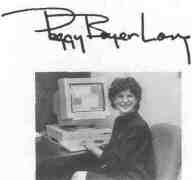EDITOR'S NOTEBOOK
We're a long way from the Emerald Roomby Peggy Boyer Long It's easy to get nostalgic about political slate-making. Now it would seem the chief qualifications for statewide office are boundless ambition and a sizable bankroll. Anyone who gets the yen figures he or she can leap right into the governor's mansion, maybe the U.S. Senate. Sometimes he or she can. Increasingly, the so-called "bad old days" — when parties would dictate who could run for what office when — are starting to look like the "good old days." In fact, political reform generally comes with trade-offs, as James L. Merriner points out in his analysis on page 18. While parties no longer craft candidate "slates" in secret, they've also lost the leverage to guide less experienced politicians up through the ranks.
No doubt, we've lost plenty along this road to reform. So perhaps the decades have begun to put a glow on memories of a time when, say, the Democratic Party's slate-making wizards met behind the closed doors of the Emerald Room at Chicago's old Sherman House. In the '60s and '70s, that party's state central committee and Cook County central committee would meet to sort out the contending interests of a Simon, a Stevenson, a Dixon, a Hewlett. Then party leaders would put together a slate and make it stick. And that was the point. Slating was designed to thwart the primary fratricide that can weaken a party. The goal was to harness individual ambition to the long-term needs of the group. As a result, the ticket was crafted to appeal across party factions. Someone might be disappointed. But good things often came to those who were willing to wait. Take the Democrats' choice for the 1970 U.S. Senate nomination. Party leaders weighed the conflicting ambitions of state Treasurer Adiai Stevenson III of Chicago, state Senate Assistant Minority Leader Alan Dixon of Belleville and Lt. Gov. Paul Simon of Troy. They endorsed Stevenson, deciding downstater Dixon was not yet widely enough known to head the ticket. And they concluded that 1972, the year Simon's term was up, would be a better time for him to head the ballot. In the interest of geographic balance, though, they endorsed Dixon for treasurer. He began his climb up the ranks. Taylor Pensoneau, who covered Illinois slate-making sessions for the St. Louis Post-Dispatch, says state party officials heard first from potential candidates at the St. Nicholas Hotel in Springfield, then moved to Chicago, where they were joined by Cook County party officials. Reporters stood outside guarded doors buttonholing wannabes. Candidates from Chicago, Pensoneau reports, were asked by party officials if they could attract downstate votes. Downstaters were asked about support in Chicago. All were asked whether they'd back the ticket no matter what. It seemed a good way to build a strong ballot. Yes, the party spoke in a single voice. Literally. In point of fact, the Democratic ticket was hammered together by Chicago Mayor Richard J. Daley, with advice from a handful of party leaders. There was little, if any, input from the Democratic rank-and-file. But news accounts of the time indicate the process was under stress long before Daley's death. In 1969, Stevenson was refusing to guarantee he would automatically accept the ticket. In 1972, independent Dan Walker beat Simon, the slated candidate for governor. In 1975, the slating sessions went public. And we can never really go back. At least not in toto. 4 / June 1997 Illinois Issues
| ||||||||||||||||

